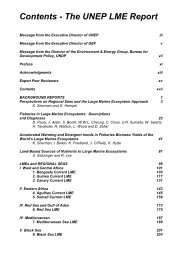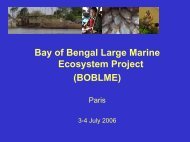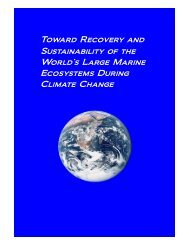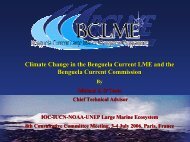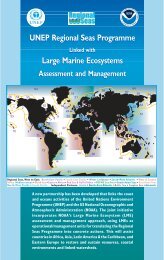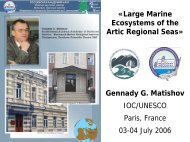Sustaining the World's Large Marine Ecosystems
Sustaining the World's Large Marine Ecosystems
Sustaining the World's Large Marine Ecosystems
Create successful ePaper yourself
Turn your PDF publications into a flip-book with our unique Google optimized e-Paper software.
support of advisors from Nor<strong>the</strong>rn Europe joined in a marine programme. The<br />
Benguela Environment Fisheries Interaction and Training Program (BENEFIT)<br />
aimed at <strong>the</strong> surveillance and management of <strong>the</strong> living resources of <strong>the</strong><br />
Benguela Current system and at <strong>the</strong> formation of scientific and technical staff,<br />
particularly in Angola and Namibia. The Benguela Current LME Programme<br />
(BCLME) became <strong>the</strong> operational arm of BENEFIT. LME projects such as <strong>the</strong><br />
BCLME offer research vessels and o<strong>the</strong>r technical facilities and opportunities for<br />
many kinds of basic research. Already in <strong>the</strong> founding documents of BENEFIT<br />
and of <strong>the</strong> BCLME Programme this was stressed and has materialized in <strong>the</strong><br />
meantime in terms of close cooperation with leading marine scientists of <strong>the</strong><br />
University of Cape Town and o<strong>the</strong>r universities in <strong>the</strong> region. The links of <strong>the</strong><br />
BCLME Programme with <strong>the</strong> governments and administration of <strong>the</strong> three<br />
participating countries have been fairly strong and have resulted in <strong>the</strong> creation of<br />
<strong>the</strong> Benguela Current Commission covering both environment and fisheries, and<br />
addressing natural and societal concerns. The dialogue between natural and<br />
social scientists has been implemented ra<strong>the</strong>r recently, but <strong>the</strong>re is still room for<br />
improvement.<br />
The following examples are mostly taken from a recently published book on <strong>the</strong><br />
Benguela Current and its LME project (“Benguela, Current of Plenty” edited by<br />
Gotthilf Hempel, Michael O´Toole and Neville Sweijd, 2008).<br />
The need for better interaction<br />
Within all LMEs more interaction is required between LME science and<br />
academia, natural and social scientists, science and industry, science and<br />
administration, science and public. LME projects should strive for more<br />
cooperation with universities. LME projects need academia as <strong>the</strong> nursery<br />
ground for <strong>the</strong> next generation of marine scientists, advisors and administrators<br />
and as <strong>the</strong> main source of new scientific concepts.<br />
In turn, <strong>the</strong> marine science community should realize that LME projects have<br />
much to offer to <strong>the</strong> mainstream of marine research and to universities: LME<br />
projects consist of a cadre of marine scientists who speak worldwide <strong>the</strong> same<br />
scientific language and who provide great, coherent data sets on many of <strong>the</strong><br />
highly exploited and productive shelf seas and adjacent oceanic waters. Those<br />
time series are badly needed for <strong>the</strong> understanding of biological variability on<br />
different scales of space and time.<br />
We also need more communication, cooperation and coordination, both on a<br />
continent-wide (mega-regional) and global scale, among <strong>the</strong> various LME<br />
projects. Such interaction will improve links to <strong>the</strong> outside world and address<br />
global and continent-wide concerns. Common strategies are needed to enhance<br />
human capacity and science, particularly social sciences within <strong>the</strong> LMEs. With<br />
112



